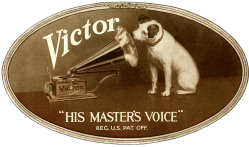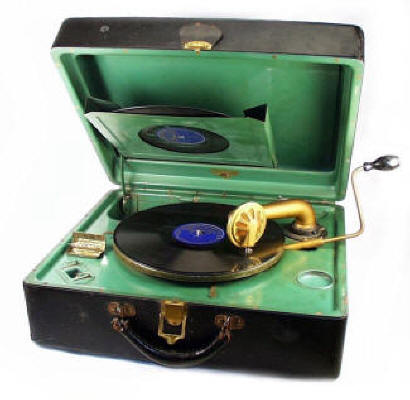The Victor-Victrola Page
Section Four: Valuation: How much is it worth???
Of course, everyone wants to know how much their Victor phonograph is worth. We receive over 140 emails every day from this website; most of them asking for a free appraisal in some shape or form. One simple rule applies here:
We don't provide free phonograph appraisals.
In other words, We won't answer email requests for free value estimates. Not even for rough guesses. Not for dying relatives, impoverished friends, bankrupt neighbors, lonely widows, or needy charities (yes, we've heard every possible request for exceptions). One well-known radio-collector-blogger calls our attitude "grouchy" because of our firm position in rejecting all freebie appraisal requests. We are not grouchy, nor are we being rude or arrogant. It is simply not possible to respond to over 140 information requests and "help me fix it" emails every single day. This policy angers some readers, as they only want a few minutes of our time. If we spent just 3 minutes reading and answering each one, nearly 8 hours of our time would be consumed slogging through emails each work day, and even more on weekends! We do make an effort to respond to at least 10% of incoming email inquires daily, especially if the question relates to a unique machine or a topic that is of general interest to many readers. However we simply can't become "pen-pals" or spend time repeating information that is already covered on this site!
When value is involved, exact condition/correctness of the veneer,
components and finish are critical in determining a valid price. It would be
easy to sit in a leather chair sipping Merlot while looking at someone's subjective
Victrola descriptions on a computer screen, and take a 5-second pot-shot at
a value figure. That guess won't mean one wit to a well-informed potential buyer when he or
she spots something incorrect on the machine or when it has a particularly
rare veneer. The devil is always in the details when buying/selling antiques.
That's why the typical "phono graph price ranges" that are presented on some
websites have little validity in the marketplace, because a large blemish or a unique finish can
make hundreds or thousands of dollars difference in the selling price. In
addition, machines in mint original condition will almost always bring good
money, but they typically have to be in the "Top 5%" (condition-wise) of the available
population. As condition rises, so does price...exponentially. But the vast
majority of what is found in attics and barns won't come anywhere close to
being a
"museum-grade" example. Anyone who tries to generalize a value
range for a
specific phonograph model based on some kind of averaged estimate or
committee-based consensus is
doing a disservice to the collector community and to buyers/sellers.
Therefore, we don't offer free quickie appraisals; our formal appraisal
service typically requires 45 minutes to research and complete, and is based
on the model, features and condition of your machine as compared to
documented sales data from auctions and estate sales. It is therefore
operated as a paid service (see below). Please don't take our policy
of not responding to each and every email question as ignoring our readers;
we simply don't have the resources to respond to the
inquiries that we receive each day.
graph price ranges" that are presented on some
websites have little validity in the marketplace, because a large blemish or a unique finish can
make hundreds or thousands of dollars difference in the selling price. In
addition, machines in mint original condition will almost always bring good
money, but they typically have to be in the "Top 5%" (condition-wise) of the available
population. As condition rises, so does price...exponentially. But the vast
majority of what is found in attics and barns won't come anywhere close to
being a
"museum-grade" example. Anyone who tries to generalize a value
range for a
specific phonograph model based on some kind of averaged estimate or
committee-based consensus is
doing a disservice to the collector community and to buyers/sellers.
Therefore, we don't offer free quickie appraisals; our formal appraisal
service typically requires 45 minutes to research and complete, and is based
on the model, features and condition of your machine as compared to
documented sales data from auctions and estate sales. It is therefore
operated as a paid service (see below). Please don't take our policy
of not responding to each and every email question as ignoring our readers;
we simply don't have the resources to respond to the
inquiries that we receive each day.
The value of antique phonographs has decreased significantly since 2005, and this phenomena is also being experienced in many other collector/hobby markets. Supply currently exceeds demand in most cases. The size of the antique phonograph collecting community has decreased dramatically in recent years; younger generations are not interesting in "collecting", and quite frankly, often don't have the available funds to purchase antiques as a hobby. Most observers predict that this situation won't be improving anytime in the near future. Also bear in mind that phonographs were produced by the millions in the early years of the 20th Century, and hundreds of thousands have survived. Online listings such as Craigslist have flooded the market with common phonographs, which has further driven down prices. Victrola (internal horn) models are still quite commonly found at estate sales and on EBay, with the average selling price in the $50 to $200 range for typical "attic-stored" machines. Authentic external-horn Victors usually bring more money, typically in the range of $500 to $6000 depending on model and condition. There certainly are some rare Victor and Victrola examples out there with unusual finishes or custom cabinets; some can sell for upwards of $20,000, but those machines are very few and far between. Readers occasionally become upset or angry to learn that their old Victrola is worth only $100, because they have seen the "same model" with an asking price of $3,000 on EBay. Just remember: sellers can ask any price they wish, and a crazy price tag means absolutely nothing in the marketplace. If it didn't actually sell for $3,000, then the asking price was too high. And most of those expensive Ebay Victrolas never sell (FACT: less than 5% of the machines listed on EBay at any price are actually sold). If you see "some old phonograph" get appraised for $5,000 on Antiques Road Show or Pawnstars, it is likely a very rare example. If your Victrola isn't that particular model, with that particular finish, in that particular condition, then it probably won't be worth $5,000. And some of the prices quoted on popular reality TV shows are incredibly inflated; the average person would never come close to realizing such high "valuations" unless they owned a large retail store with lots of unwitting customers coming through. The marketplace is the best judge of true worth. Value is based solely on rarity, condition and demand. It represents what a reasonable and knowledgeable buyer will pay in the current market. That is why we use statistical estimates of value based on real sales data from all sources.
If you want to know
how rare your Victrola is, and get a rough idea of what it might be worth,
finish reading these introductory pages, and then click on the "Products"
link (this can also be accessed from the home page).
Just follow the instructions carefully. It will give
you an indication of how common (or uncommon) your Victor machine is, and also will help in
establishing a rough value range. We have attempted to provide as much general
information as possible on this site. That's the best we can do unless you
contact us
and make arrangements for an paid appraisal on your phonograph.
To better understand the condition-rating and
appraisal process, a detailed explanation can be found
here. Be aware that this is a
complex endeavor, and involves considerable research.
For those interested in a professional paid appraisal, please follow the "services" links listed below.....otherwise continue by selecting "More Information"


